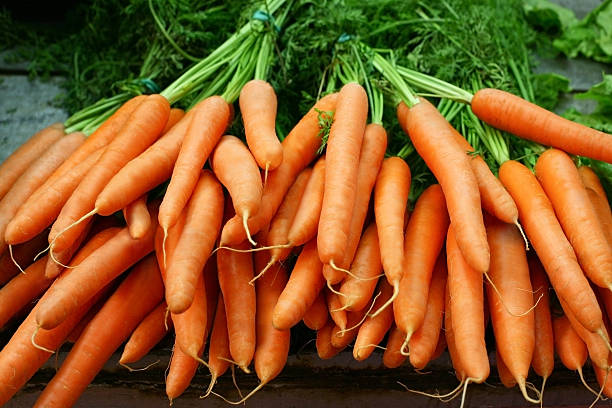Putting a portion of carrots on your plate costs less than ten pence. They are cheap and nutritious but – fear Britain’s farmers – somewhat taken for granted.
That is why a group of six farmers have clubbed together to launch the first UK National Carrot Day to celebrate the iconic vegetable.
The dedicated day will take place on Thursday, October 3rd, and heading up the event will be eighth-generation farmer Rodger Hobson.
Rodger, whose family have farmed the same land near York since 1847, chairs the British Carrot Growers Association (BCGA) and is determined to dangle the proverbial carrot in front of as many people as possible, from supermarket shoppers to school children and professional chefs.
“Whenever I meet new people and tell them I’m a carrot farmer they always smile,” reflects Rodger, who likes to eat his carrots raw with hummus or honey roasted with Sunday lunch.
“Even kids who say they don’t like veg tend to eat carrots. It’s maybe because of their other role as the snowman’s nose, but they are a happy, feelgood veg.”
The UK has traditionally been 97% self-sufficient in carrots, but last year’s weather – the summer was the hottest since the height of the Roman Empire but went on to record 11% more rain than average – left 2023 notched up as the worst ever year in Rodger’s memory for growing carrots.
“This led to a lot of carrots coming in from Israel, Spain, France and even China,” says Rodger, who explains the double-whammy impact the freak weather had on his carrots. “They wilt when they get too hot and then are more susceptible diseases while they are sitting in wet soil. “Unlike lots of other vegetables they are harvested and sent straight off to the shops – they can’t be stored like potatoes.”
Looking for the red tractor, the sign of being British grown, on packaging is one way Rodger says shoppers can support the UK’s carrot growers. To try and produce healthy carrots that need less pesticides, once a field has been harvested Rodger doesn’t grow carrots in it again for a whole decade.
“British farmers do care about the environment and quality food and it would mean the world to us if this campaign got people to stop taking the carrot for granted, to understand all the hard work that goes into growing it a bit more.
“Buying British has got to be better for both our health and the country’s carbon footprint than carrots that have been flown in from the other side of the world,” he adds. “Provenance also affects price; British carrots cost around a third of what shoppers were paying last Christmas for ones from Israel.”
Rodger, who is constantly trying to outsmart burrowing bunnies trying to eat his carrots like a scene from a Bugs Bunny cartoon, wasn’t too concerned about some supermarkets discounting packs of Christmas veg down to 15 pence a packet.
“At least the retailers were subsiding this, it wasn’t that they were paying producers any less and it got people talking about and buying more veg.”
However, his friend and fellow sponsor of National Carrot Day, farmer Guy Poskitt didn’t like it.
“I think these ridiculously cheap prices undervalue products and increase food waste,” says 61-year-old Mr Poskitt, who grows around 50,000 tons (packed weight) of carrots annually with his 23-year-old son Ben near Selby, North Yorkshire.
“How many people would buy extra bags because they were so cheap and end up throwing some of them away? There isn’t a single farmer in the world who likes to see their produce go to waste and not eaten.”
Mr Poskitt believes fruit and vegetables sales are harder than ever because they are often no longer the first thing customers see when they walk into a supermarket.
“Fresh fruit and vegetables always used to be straight in front of you, as soon as you walked through the door,” he recalls. “Now, when you walk into lots of supermarkets, the first items you see will be non-food related, like clothing or homeware. You might have to walk halfway around the store now before getting to the fresh fruit and vegetables – which just doesn’t give them the same impact as before.
“Without those displays we have to work harder. If I get talking to somebody who isn’t involved in farming, they are always genuinely interested in how we grow carrots. They find it fascinating how we are trying all kinds of ways to work with climate change rather than just throw the towel in. Farmers need to make the most of this interest and get better at explaining what we do.
“As a farmer, a little bit of interest in what you do is very much appreciated and I hope this will be one of the lasting legacies of Carrot Day.
“With our limited budget we’re not expecting miracles with Carrot Day, but whatever support we get we’ll really appreciate.”
Follow us on Instagram: @lovebritishcarrots
For more information on the British Carrot Growers Association, visit: britishcarrots.co.uk

